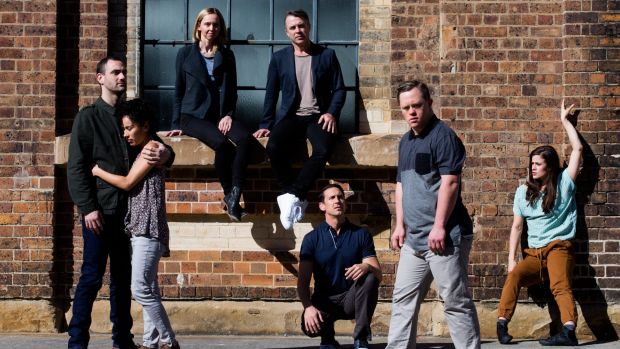
Photo: Edwina Pickles
Home | Blog | Off the Record
Off the Record
A couple of weeks ago I went to see Force Majeure’s Off the Record in partnership with Dance Integrated Australia. I was especially interested as I was a cast member of Urban Theatre Project’s Simple Infinity presented at Carriageworks a month previously. Both works were commissioned for an overarching series under the banner The New Normal and funded by the NSW government arts and disability strategy.
Both works featured artists of differing abilities.
While I would not say that the approach taken by Director Rosie Dennis was to ignore our differences, it was definitely not addressed in the same manner as Danielle Micich and Philip Channells’ co-directorship of Off the Record.
Imagine a world where disability was not considered a difference, was not hidden, ignored or compromised. This was the world I and my fellow cast members and creatives were charged to create. In our world, logic had shifted and favoured a different perspective. It was as if our interior selves dominated and our exteriors were simply the veneer keeping us separate and distinct.
For Simple Infinity Dennis was adamant that her goal was to make a shit hot work with a cast that just happened to have different abilities. This was sometimes very difficult to reconcile as surrealist shifts in thought and repetitious confines of compulsion were favoured, even fostered, in the world we were devising over majorly accepted norms in rationale. By the end of our run I began to think I could and was inhabiting that world.
Off The Record took a completely different approach by comparison, by pointedly placing a spotlight on disability, directly addressing the general public’s misconceptions. The characters could be manipulative, could use their disabilities to their advantage, as is the case with the deaf character, played by Alex Jones, who we discover has been trying to cuckold his girlfriend into maintaining a relationship by utilising his deafness to induce guilt. Jana Castillo, a dancer with tourettes syndrome, plays a character within a character and appears to have a physical weakness which she changes out of in an area of the stage she treats as backstage, only to resume the facade until her character is tired of upholding this charade.
In the world Micich and Channells create, there is a shift in power as the “able bodied” interpreter played by Neil Phipps appears equally vulnerable as the tables are turned and he accuses the deaf character for treating him like a guard dog, a commodity.
I was intrigued by Marnie Palomares’ character, who is utilised well in this work. She also appears able bodied but is equally vulnerable falling prey to disastrous relationships, her lack of concern for her own well being possibly masking a hidden weakness.
Both Palomares and Castillo are superb dancers at the height of their careers. Castillo moves with a compelling idiosyncratic vocabulary, at one time inhabiting the body of a person with palsy with an incredible attention to detail and poignancy, only to eschew this for highly virtuosic solos and duets with Palomares.
Castillo’s form consists of lines that are slightly marred by a sickled foot which don’t appear as affectation, such is the result of the sophistication in this choreography. She has imbued a poetry to what would, in a pedestrian context, be considered an anomaly.
Gerard O’Dwyer rounds off the cast. I have seen him around the traps in Parramatta as he also works at Riverside Theatres and know him to be able to out talk even the most seasoned conversationalist. One of the show’s most compelling images was hearing him deliver a monologue as a microphone hung suspended from the ceiling, swinging back and fourth over his mouth, as he lay on the floor. From his character I was made intimately aware that he is a man first and foremost and the person with a disability is secondary to this.
It was definitely a challenge to be a part of one of these works in this season. I found myself constantly redefining my perceptions, my work practices and my ethics. It wasn’t until I saw Back to Back’s Ganesh and the Third Reich a few years ago that I realised how much I had assumed and misjudged what disability meant or didn’t mean, without even realising. I do know that these highly nuanced works operate on many complex levels, where the individual and their portrayed character are much more intrinsically linked; laid bare for scrutiny. As a consequence of this added vulnerability, there is a heightened attribution of vitality in delivery that is courageous and bold.
-Vicki Van Hout

